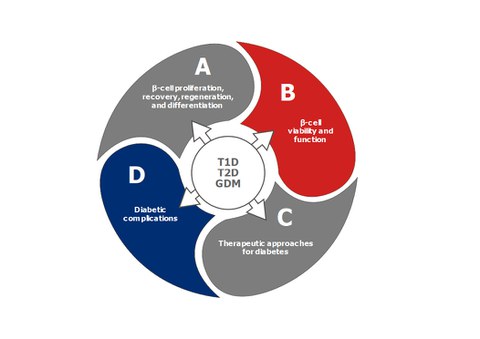Scientific objectives
he IRTG-ICSMD addresses a fundamental core question: How can novel methods and techniques be developed and engineered to halt and even cure diabetes and metabolic diseases? From the clinical perspective, there are still many unanswered questions: a) how the destructive immune response in T1D is mediated and which steps are needed to reverse it at an early stage; b) how β-cells can regenerate or how stem cells or pancreatic progenitors can be used to treat T1D or T2D at late stages; c) how the present obstacles in β-cell transplantation and regeneration can be overcome; d) how human pluripotent stem cell (hPSC) models can be used for cell replacement therapy or for disease modelling; and e) how peripheral and central organs such as the heart and the pituitary are affected in the course of diabetes and metabolic dysregulation. The added value of the IRTG-ICSMD’s qualification concept is to focus on both T1D and T2D, by applying the most recent laboratory and clinical techniques available at TUD and KCL to achieve results of the highest quality and relevance in both basic research and clinical application.

Overview of the four research areas reflecting the focuses of the 13 projects of IRTG 2251. T1D, type 1 diabetes; T2D, type 2 diabetes; GDM, gestational diabetes mellitus
The IRTG-ICSMD aims to provide a novel and innovative education programme for highly talented PhD students, who are competitively recruited internationally. They will receive cutting-edge training in the emerging fields mentioned above in order to help them understand, treat or even cure diabetes and metabolic diseases. During the 2nd funding period, 13 collaborative research projects will continuously address the important unanswered questions mentioned above, which are organized in 4 research areas that reflect the focuses of the research projects. Additionally, we will address how SARS-CoV-2 influences the progress of diabetes.
